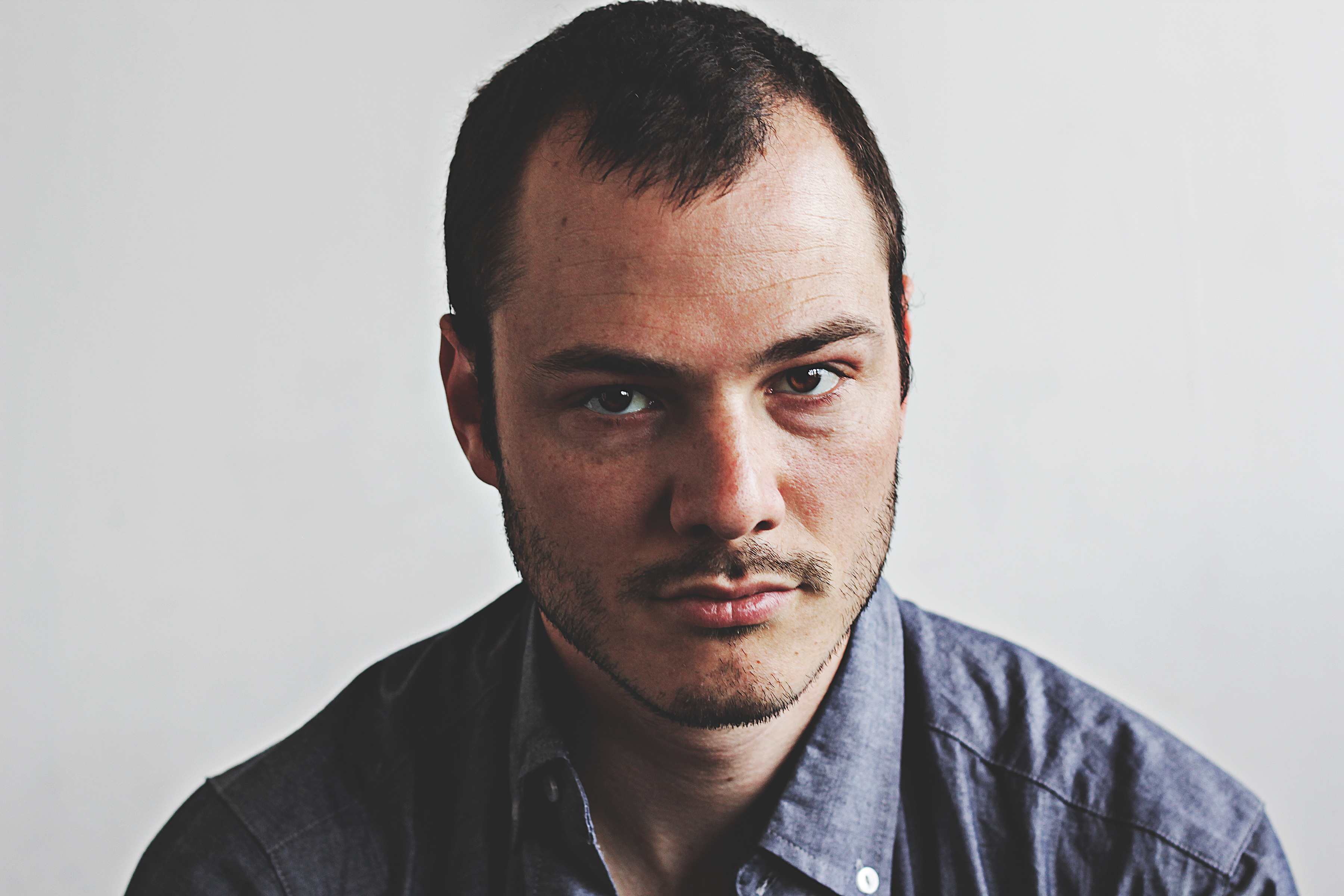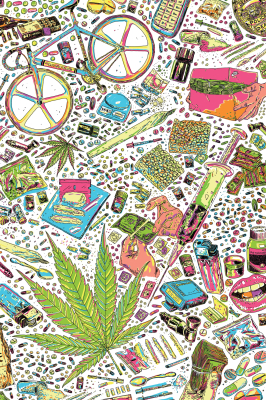Strolling around, I frequently wonder what strangers around me are thinking at any moment, especially in New York. Writer Peter Madsen takes a step further by connecting with these otherwise nameless passers-by with his blog Word on the Street New York, which features weekly, on-the-spot interviews with some of the city’s most intriguing denizens. Peter’s signature interview style—one part journalism and one part shooting-the-shit—begets personal conversations both thought-provoking and voyeuristic. He takes the same Q&A approach with his debut book Dealers (powerHouse), which showcases some of the Big Apple’s anonymous drug handlers. With Dealers, Peter challenges stereotypes and gives a fresh perspective on the hustlers behind these controversial substances, all by asking one question at a time. —Matthew Lynch
Can you tell us a bit about how this book deal came about?
I had been doing Word on the Street New York—first at Street Carnage and later at its current home—for a couple years. I’d amassed over 250 interviews with people—mostly panhandlers—when Will Luckman, the managing editor at powerHouse Books, asked me to meet to discuss possibly publishing WotSNY, which he said he liked a lot. After mulling it over, pH suggested I interview people I would inadvertently encounter while doing WotSNY: dealers. They gave me a month or so to turn around four or five interviews and when I did they liked them, so we signed a contact. Ecstatic, I immediately bought myself a gold chain, which seemed like a fitting way to blow one’s drug dealer book advance.
I’m interested in what makes a “great interview.” What is your process like?
I am also interested by what makes a great interview. I find it useful to think of it as a craft. In the instance of Dealers, as with WotSNY, I would sit down with each subject one-on-one—if the person has friends around you’re going to get a completely different, more guarded, and self-conscious interview—and talk for about an hour. We’d drink coffee or beer, maybe smoke weed but probably not (I’d want to stay focused). I wouldn’t have pre-written questions but I would have a couple topics in mind that I would want to cover. I recorded everything with my iPhone 4S, which I would later upload to my computer and transcribe right out of iTunes, or I’d send it off to my friend Arman, whom I paid to do a bunch of transcriptions. Also, I’ve erased all interviews from my phone and computer (H/T Edward Snowden). [Ed note: H/T = Hat Tip!]
I am wondering if you took any answers with a grain of salt. How comfortable are you with the validity of the stories you heard?
No, I never took any answers with a grain of salt; I did my best to question subjects’ statements, press them for details, or, that the most extreme, to simply say, “Huh?” The only interview I wished I had pressed harder on was Brian, because he talks about coming clean to his parents about what he’d been doing down in Florida and the LES [Lower East Side] and it seems too easy that his father would be cool with dealing with an ominous threat that his very young son has brought upon the family. This also was an example of my not being in control of the interviewing environment. We spoke at a diner yet he had a couple friends with him—perfectly nice people—but I got the feeling that they’d heard his stories before and in a way that messed with my judgment. But no, I didn’t receive any stories I suspected to be fake, but I would have omitted them if I found out they were.
I loved the bartender and cop editions. The bartender because he’s technically also slinging a drug, and the cop because he’s the “enemy.”
I chose the bartender, Tommy, because I happened to live a couple blocks away from the now defunct (or, as it were, perpetually “under renovation”) O’Connor’s, on Fifth Avenue and St. Mark’s in Park Slope and I went there a lot. Tommy is a bartender’s bartender, right down to that everlasting Long Island accent and his truncated parting words “Home safe.” Tommy appreciates barside conversation, and that is what got me to thinking I should interview him. I found it interesting that no matter how much I pressed him to concede that I drink too much, he wouldn’t do it. He adopted the typical, “Hey, if I wasn’t serving you, the guy down the street would” line used by people who sell things that are addictive.
At any point did it feel like the dealers were getting agitated by your questions?
No, I wouldn’t say I agitated any dealers; if anything, the only time I agitated a dealer was when I was in the backseat of his German sedan and I asked him if I could interview him for my drug dealer book. He said, “Oh, so I can get arrested like that coke dealer that Vice interviewed?” I was embarrassed, and he never returned my subsequent texts. If, in an interview, I found I was hitting a nerve I would make the immediate decision whether I should push more now or make a mental note of the sore spot and try to return to it later. Also, I’ve maintained a 100% takedown policy, which means I let subjects review my edits of the interview and strike or scramble any details they felt were too identifying. In fact, I omitted two interviews altogether because the subjects decided against it.
Morality, stereotypes, education, race, etc. are prevalent in your questions. Are you attempting to change the social perspective of how people see others?
Yes, I suppose so. More than anything I wanted to demonstrate the great variety of people who sell drugs. I wanted to do justice to Luc Sante’s quote, which I include in the front of the book: “The criminal class is a more exact cross-section of humanity than any trade could be.” I guess it’s up to the individual reader to decide whether they think differently about dealers.
In the acknowledgements, you give a shout to people like Eddie Huang and your skate community. What kind of role did those guys play in the making of this book?
I shout out Eddie Huang because I admire him for his work ethic and example. When I first met him he was a week away from opening BaoHaus—which people now know is a really popular Chinese/Taiwanese food spot—but then it was just a leap into the darkness. I also admired the fact that Eddie, having always felt misunderstood and underrepresented, wrote a memoir to address that. Judging by the fact it made the New York Times extended bestseller’s list, I’d say he speaks for a lot of other people, too.
I thank my skateboard community because it was skateboarding that first helped me see the world differently—I’d say more accurately—and the skateboard magazines got me really interested in reading and writing. I remember loving the long interviews with the pro skaters magazine writers like Dave Carnie and Chris Nieratko would do in Big Brother. I loved not only how oddball and weird they would get, but how they could make being an intelligent, inquisitive skateboarder cool. Granted, the coolness didn’t rub off on me, but writing a bunch of stuff for Thrasher was a gratifying way for me to contribute to the skate world. I think skateboarding is a great thing for a parent to give a child because if he or certainly she really takes to it, they’ll also get into photography, video/film, music, scoring, art, etc. Plus a skateboard takes a person to different places and introduces them to people they would never know otherwise. I’m not exaggerating when I call skateboarding the Giving Tree! There was a Consolidated graphic to that effect.
Are you still a bike messenger? What’s next?
Ha ha. I have retired from bike messengering and I’m now subsisting on writing and editing. Man, do I love not risking my neck every day for a paycheck! Beyond getting a copy of Dealers in the hands of every writer who’s ever inspired me, I would like to get Word on the Street New York published. I would pull some of the best interviews I’ve already archived while conducting a whole bunch of new ones. I really liked doing Dealers and I’m proud of the final product (particularly Christy Karacas’s kickass cover!), but WotSNY has been a real labor of love. I think there is a simple humanist beauty that shows throughout all the interviews, and realizing that beauty in book-form is something I want to make happen. I feel like Dealers and WotSNY have been research for the short novel I’m working on, which is a completely terrifying yet thrilling new process for me.![]()

